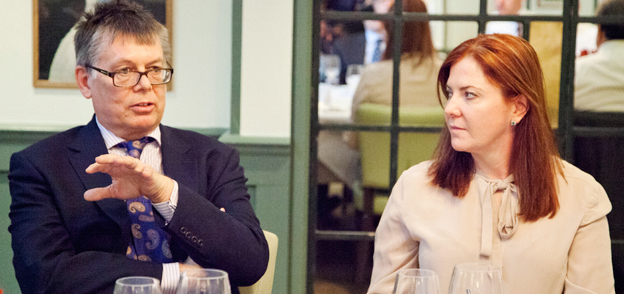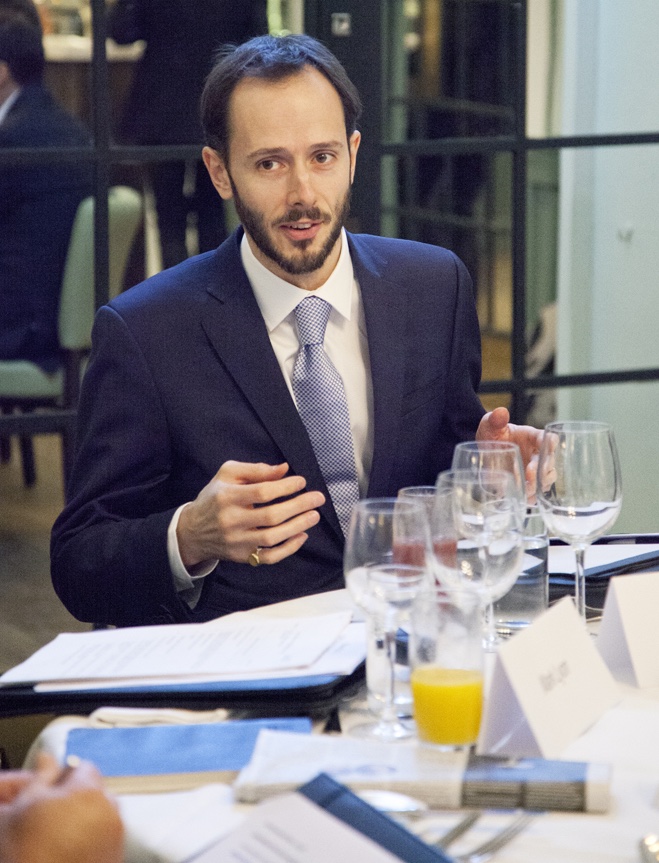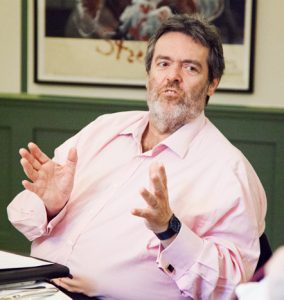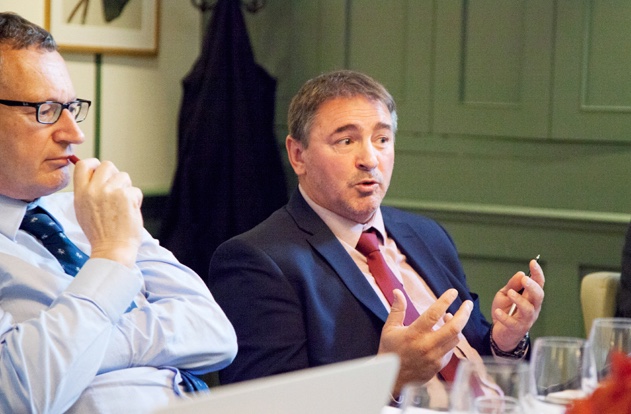
The ongoing separation of investment and asset allocation within the LGPS has emerged against a particularly volatile geopolitical backdrop. To explore the impact on local government pension investments, we invited a representative of each of the eight LGPS pools to share their views on some major geo-political themes and to ask if asset allocators at the fund level should be thinking about a change in direction. The meeting was held on April 5th, 2017.
Roundtable Sponsored by
At the table…
LGPS
Mike Jensen, CIO, London Pensions Partnership
Mark Lyon, Head of Investments, East Riding Pension Fund (Border to Coast)
Mark Mansley, CIO, Environment Agency (Brunel Pensions Partnership)
Leyland Otter, CIO, Merseyside Pension Fund (Northern Pool)
Anthony Parnell, Treasury & Pension Investments Manager, Carmarthenshire County Council (Wales Pool)
Julian Pendock, CIO, London CIV
Colin Pratt, Investment Manager, Leicestershire County Council (Central)
Nick Vickers, Business Partner (Pension Fund), Kent County Council (Access)
Sponsor
Moira Gorman, Client Director, Columbia Threadneedle
Toby Nangle, Global Co-Head of Asset Allocation and Head of Multi-Asset, EMEA, Columbia Threadneedle
Moderator
Peter Findlay, Publisher, Room151
Peter Findlay: So we’re here to discuss geo-political risks and how they’re influencing investment decision making and asset allocation strategies. Toby, let’s start with some initial thoughts from you.
Toby Nangle: I’ve been in markets and fund management for twenty years but there has hardly been a quarter that’s gone by without someone saying we live in volatile times and face unprecedented challenges. I’d argue it’s as it ever was. There are many things going on at the moment, but we have to think about what is genuinely new and what is potentially impactful for pension scheme members and for asset allocators. I think what’s genuinely new is the level of risk premia available in the markets. For instance, the trading range of bond yields is at a 500 year low. That is new.

But we don’t dismiss geo-political risk of course. The threat to globalism that comes from changes in the political landscape in the United States and Europe for example, is something that we’re monitoring closely. In the United States, the seeming retreat from ever deeper globalisation signaled by the cancellation of the TTP and the TTIP, and then potentially bringing in border adjustment tax — which would signify an erection of tariff barriers of some sort — is potentially quite a profound set of changes from an asset allocator’s perspective.
Looking back, the integration of China into the global labour market over the past 35 years and a variety of other South-East Asian markets has meant that you can have faster growth without inflation coming through, and that’s pulled down bond yields on a secular basis.
If that process is threatened or goes into reverse, then that has quite profound implications — not for chopping and changing the portfolio over the next three months, or so — but for how you think about the correlation between fixed income and equity markets. It will probably impact how you think about valuation and what returns you can expect from investing more generally, and also how you evaluate your liabilities and how they may change in the future.
The French elections are coming soon and we think the market has essentially drawn the wrong lessons from the analysis of Brexit last year. That is to say the market has given itself a nice narrative, that the polls told the wrong story and were predicting a clear win for Remain which everyone could safely invest in. I don’t think that was what the polls were saying at all. If you went through the methodology, it was a statistical tie. Plus or minus four percent, in a polling context, is not hugely significant.
So, we think that the market has incorrectly concluded that you cannot have confidence in election polls. We’d argue you can. Of course, anything can happen between now and May, but at this point in time there is a 15-20% lag for Marine Le Pen behind any candidate at the moment, and that is a statistically significant margin.
PF: What is the view elsewhere of the risks posed by Marine Le Pen or populism more broadly?
Julian Pendock: Like so much in the world, the problem is it’s a binary outcome, just as Brexit was. So, the next question is how you can mitigate the risk and for us, of course, we use external managers so we have to ask them the right questions. Take the peak of globalisation, which is tied into political risk, I think people will see quite clearly that the high watermark there was the collapse of the Doha round of talks. We’ve been asking managers, particularly those in global equities, whether the companies they invest in have very stretched supply chains and what they’re looking to do to mitigate that or step away from those companies. For us sitting in the London CIV, we have to be sensible and ask the right questions.
As for populism, is this a new thing? No, populist politics is common in the rest of the world and I think people are starting to grapple with the idea that this is possibly just part of the process of the unwinding of the post-1945 world order. This is not a sudden thing and history shows that it’s often a few years after you have a financial earthquake that the political regime gets changed. The pieces are in the air, but all we can do is make sure we keep a watching brief.
Mark Mansley: Yes, I would agree on Europe: I think the Dutch election result was quite pro-Europe. If anything, I’m probably quite positive on Europe and I actually think it’s getting its act together rather than disintegrating, as some would have it. I can only see one scenario in which Marine Le Pen gets elected and that would be if the left vote comes together, then it becomes a choice between the left and the right, which I think is pretty unlikely.
If you’re looking at the long term, one of the fundamental risk drivers is that for some time now, since the great financial crisis, or even before then, the economic system has totally failed to deliver for the ordinary working person in the west. Median incomes have stagnated, real incomes have in many cases declined and so forth, and that’s what’s fueling the likes of Brexit and Trump. I don’t think they represent the answer in any sense, but that potentially over the medium term is quite a volatile situation.
There is only a certain amount you can do as an investor and I guess we’re always trying to be very careful in understanding our risks and clear about what risks we want to take. We’re trying to really invest on fundamentals when it comes to finding opportunities that are perhaps a little bit outside the mainstream.
I don’t think we’re seeing a radical change, it’s more about focusing on our principles and trying to establish where there is value and where we think there is some insulation from risk.
Peter Findlay: Moira, are there opportunities for you in the current climate?
Moira Gorman: As a provider, we obviously need to listen to what the funds and the pools themselves are doing and there are going to be different opportunities for us in terms of product provision within the different set-ups. I would point to someone like Toby who’s able to navigate some of the shorter-term and longer-term asset allocation changes that will be needed. Of course, some of the pools may be able to do that themselves, and some will be open to support from providers like Columbia Threadneedle Investments in facing these geo-political challenges. The basic message is, in all market conditions, we are looking across a broad range of asset classes at delivering the different solutions that the pools and their underlying funds are looking for.
PF: What other issues are having a meaningful impact on the way you all look at LGPS investments?

Leyland Otter: There are issues that are getting our elected members’ concerned, not least of which is climate change and ESG (environmental, social and governance). In fact, we had our quarterly meeting yesterday and had four external managers presenting to us; I think it was about two hours before they got a chance to speak because most of the discussion was about what we are doing to de-carbonise our portfolio.
We come under pressure like other LGPS funds, from various groups, to totally divest from oil companies, for example, but it’s a balancing act. We have a fiduciary responsibility to our stakeholders; we’re trying to generate as much return on our assets as possible for our pensioners, so we’re in it for the long haul.
Peter Findlay: Do the councilors accept that?
Leyland Otter: I think they do. We believe in constructive engagement with companies and we have some good examples of work done through the LAPFF where we’ve seen some positive outcomes on executive pay. I know some authorities have divested of their tobacco stocks; we’ve not done that but we’re committed to engaging with companies and taking steps in the right direction.

Anthony Parnell: I’d echo that. I think geopolitical risks will come and go but ESG will always be there now. For us, as a pool, that’s right at the top of the agenda, especially with the introduction of the ISS (investment strategy statement). The geo-political stuff, is less of a worry. We don’t get FOI requests about Trump or Brexit but we get a lot about our carbon footprint and, as a pool, that’s something we can look at more critically than geo-political risk. Before pooling, as a £3bn fund, we didn’t have huge clout but as a £15bn pool, we can be more effective across environmental, social and governance issues.
So, we engage both directly and through the LAPFF and try and work with companies to make a positive change.
Mark Mansley: We’re a fund that has integrated ESG into our investment processes for twelve years now and I think we would be very clearly of the view that if you do this in a sensible risk-aware way, it is entirely compatible with fiduciary duties and entirely value adding. To give one of many possible examples, we have a value equity allocation which is our least green allocation and I have been talking to quant managers about integrating ESG into that. They back tested an ESG model and have come up with a better product, and this was something which was supposedly optimised beforehand. So, I absolutely believe that if you do this the right way — and we don’t believe in screening or the simplistic approach — but if you do it the right way, it is nothing to be scared of.
Peter Findlay: Mike, where are the risks for you?

Mike Jensen: While I’m reasonably optimistic that we’ve seen the high-tide mark in European populism, I still have concerns elsewhere in the world. I think possibly my biggest concern is just how complacent the markets are. The level of volatility out there is crazily low and as pension funds with long-term investment horizons, that’s something we should be taking advantage of, but none of us are really set up to do so. That’s an interesting investment problem which doesn’t have any obvious solution from a risk management perspective, currently. We effectively have to use our currency positions as a source of geopolitical hedging which isn’t tremendously efficient.
I still feel that from a pension fund perspective, the overriding risk, which trumps everything else, is global demographics. Maybe we’ve got a reasonable handle on the UK, but global demographics — especially emerging markets — could change the whole footprint of global trade and the whole footprint of global returns.
The demographic timebomb was assumed to be just a western problem, and it isn’t just a western problem, it’s definitely a global problem and is becoming a global problem a lot quicker than everyone expected it to.
Peter Findlay: So what does that mean for pension funds?
Mike Jensen: Well, I think there has been an expectation for ten years now that at some point we’ll get back to some growth and an interest rate inflation scenario and that’s just rubbish, that will not happen.
We may see intermediate cyclical changes in interest rates, but they are going to be relatively small and relatively short lived. And this isn’t just an LGPS problem: the feeling that time will be the solution for the pension fund industry is much too Panglossian. In ten years’ time things may be better. but they could equally be worse. We remain very overweight equities, and we’ve had a great ride with equities, but it’s not impossible that you get a twenty-year sideways move.
So, the assumptions that you can sit tight and equities will come to the rescue, or that we’re moving away from the low-rate environment, are very risky assumptions to make.
Nick Vickers: I’m an accountant with a degree in economics, but actually I think this big picture stuff is a lot of noise. I’ve done the job at Kent County Council involving the pension fund for twenty years this month, and if we had reacted to every short-term thing that’s going on in the world, we would have gone mad several years ago.
A key word I think Mike used in a slightly different context is complacency. I think whatever you do in life, you always have to think: are we’re being complacent?. If I look at where our fund is positioned, we don’t manage any funds ourselves, we don’t intend to, nor does the Access pool, because there’s a big world of investment managers out there to use.

We try to work with investment managers who are going to take long-term positions based on bottom-up stock selection, and they’ve got lots of tools in their box to play with. We want good investment managers who make bottom-up decisions and buy good stocks that are going to produce dividends in the long term to help us pay our pensions.
Equally, we’re a fund that loves direct property, we’ve be adding direct property; we’ve also started adding residential property to the portfolio on the basis that people are going to occupy these apartments and they’re going to pay decent rents and there’s a pretty good chance that they’re going to be able to pay those rents on a very long-term basis.
Fundamentally, I need cash to be able to pay future pensions and that bit I think I can do something to control; whether Marine Le Pen wins the French election, or there’s a blow up in Italy if the Five Star movement forms a government, … I can’t control any of those.
I’ve had a very stable superannuation fund committee for a very long time with the same chairman for sixteen years. And we basically like equities and property, and if it’s not equities or property we don’t like it. We’re going to have a new chairman and a new committee soon, so actually, for me, it’s very much a fresh start and although we’re still mildly cash flow positive, I think income generating assets will be our big focus for the asset allocation review in the second half of this year.
We have got a massive exposure to equities and I agree with Mike that that is something that could give us sleepless nights.
Peter Findlay: And where do you see that income coming from?
Nick Vickers: Well, I think the sort of multi-asset income funds that we’re looking at, they have some very interesting ways of generating income returns. I think we have to have less equities and, because I’m old and conservative with a small c, I still like the characteristics that UK commercial property bring us, and I think we will invest further there.
Peter Findlay: Okay. So Colin, ignore the noise, focus on the day job and everything will be OK. Do you go along with that?
Colin Pratt: By and large, yes. Geopolitical risk has always existed, will always exist and we should never, ever underestimate the ability of individuals and companies to adapt to a situation that they are thrown by government policy or whatever else.
Anybody who would have said Brexit would end the way it did, with the UK market 20% up, would have been called a fool. Yet that’s where we are.
Pension funds of any size are supertankers and unless politicians are willing to cede a huge amount of power to the likes of us, as internal investment people, we’re unlikely to try and be too clever in the short term making big asset allocations decisions.
I think we should have a set-up that allows us to take opportunities, but not to the point where you’d be switching 5-10% in and out of equities, for instance. And if you’re going to switch 5 or 10% out of equities, that should be done synthetically.
But by and large I think geo-political risk is overstated in its importance. The reality is, are we ever, in any one year, going to take more than 2.5% out of equities and put it into something else? The reality is probably not, because it’s too big a decision for people to take because of the risk implications. And the risk is not just about whether your assets go up or down — but whether or not you’ll look a fool.
Nick Vickers: Absolutely. And there is a lesson from one particular fund that did make that very big move out of equities a few years ago and had an absolutely appalling time.
Colin Pratt: Nobody would have believed that probably the biggest geopolitical risk of recent years involves the UK, and that’s a fact. Markets have been very sanguine about what the outcome of Brexit will be and we don’t know what the outcome will be. It may be all plain sailing, it may be a disaster, we just don’t know.
Markets have definitely given the benefit of the doubt, so far, and we as investors may look back in six months, a year, two years, as the negotiations go on, and think: we’ve missed a trick here … we should have known that there was a danger of a big downside here, we should have taken money off the table. Will people do that? I think the answer’s no; it’s too difficult a decision to take. And the structures are not necessarily in place to be able to take those decisions.
Peter Findlay: Is there anyone around the table who thinks that the value of sterling will rise against the dollar in the medium to long term?
Mark Lyon: No, but I’d like some protection just in case it did, subject to the cost of that protection.
Mark Mansley: My guess is that’s one of the big strategic decisions … it is a bit of a binary decision, but one of my big questions is: has sterling reached the point yet where it should be hedged? I find it difficult to believe that it has.

Julian Pendock: Since September 2014, when the oil price started to crash, currency is where the big movements have been. And so the double problem for us has been our liabilities and sterling. And then the dollar, obviously, is a central driver for everything else and your call on the dollar against a range of currencies will then influence a whole range of decisions. I think currency with us will be quite important as we look at things going forward.
Toby Nangle: It’s a big decision for us in our asset allocation funds. One of the ways we navigated the Brexit vote was changing the currency composition and, based on analysis of the polling data, we were pretty much faced with a coin toss.
So, the question was, how do we make sure we don’t get a big benefit, or loss, from something that essentially we have no view on? And changing direction quickly and efficiently was best done using currency. Since then this question has been very much on our minds: have we got to a level which is fundamentally cheap? And we don’t have a very, very strong view on that, as yet.
Peter Findlay: Mark, you’d like some sterling protection. What other risks are you keen to mitigate?
Mark Lyon: We’re just in the final stages of agreeing an IMA (investment management agreement) to put in an options strategy on UK equities which gives us participation in some of the upside, giving away the more extreme upside in order to protect some of the downside risk. And that’s part of a joint strategy.

We’ve just gone through our asset allocation review and reduced our UK equity exposure in favour of alternatives — the main reason being that equity market valuations are above their long-term average. We prefer to use CAPE than forward PDs. I appreciate CAPE has come in for a bit of criticism recently, but I still think it’s quite a decent long-term indicator and we’re not trying to time the markets.
Traditional fixed income doesn’t really give you anything, so we’ll probably extend our strategy of the last five years of focusing on alternative credit or private credit because we think there’s a very good risk adjusted return. Part of that is illiquidity premium but even though it’s liquid, most of it is contractual cash paying income, so it kind of generates its own liquidity. Yes, we won’t be able to sell it tomorrow if we need it, but if that’s the case, we shouldn’t be in those kind of assets anyway, so it should just generate a steady flow of income to pay the liabilities.
Peter Findlay: Toby, how would you sum up?
Toby Nangle: There seems to be a certain amount of agreement that the world always looks quite challenging and that the fear of these risks shouldn’t set in, which is very encouraging. It has been a very profitable time to invest over recent years in which we’ve seen a number of major risks unfolding.
I am keen to pick up afterwards with Mike on the issue of global demographics because I agree that that’s really important, and has the potential to become a game changer, although I would draw a different conclusion from Mike in terms of the impact on fixed income.
Lastly, while we believe that the prospect of a Eurozone crisis over the coming years is overblown, it is still real and needs to be navigated or mitigated. And there will be opportunities along the way.












